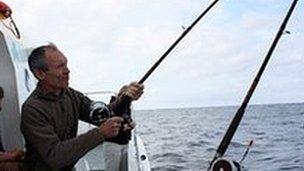Environment Minister John Griffiths goes shark tagging
- Published
Environment Minister John Griffiths has joined a team of researchers tagging blue sharks off the Pembrokeshire coast.
WWF Cymru have been capturing the giant fish as part of a conservation project to track their movements.
Mr Griffiths helped reel in two sharks for assessment during the trip.
The blue is the most common shark found in Welsh waters and the fish are known to travel hundreds of miles each year.
When tagged, the shark's length, weight, sex and condition are all recorded.
Four sharks - measuring about 7ft (2.1m) - were caught on the minister's tagging mission before being released back into the sea.
The boat was out as part of the UK Shark Tagging programme, on a trip organised by WWF Cymru to show Mr Griffiths wildlife off the Welsh coast in need of protection.
"It's quite a leap forward given that the last fish I caught was when I was about 10 years old and it was an eel with a throw-out line," he said.
"The sharks are fantastic creatures and I was thrilled to reel one in and play a part in understanding their movements which will obviously help with conservation.
"There is still a lot we do not know about the marine environment - and this has been a great opportunity to see evidence gathering first hand.
"The more we know about marine habitats and species in our waters the more we are able to make informed decisions about how we manage our seas."
Anne Meikle, head of WWF Cymru, said: "We wanted to share with the minister a personal experience with some of the wonderful range of creatures that can be found around the Welsh coast and to highlight that there is still much we don't know about many species that visit our waters.

The environment minister reeled in two blue sharks
"Sharks are a highly mobile species but we don't actually know that much about them.
"What we are doing is finding out their vital statistics, how old they are, how big they are, putting a tag on them so if they are caught again, we can get some data about where they go.
"We've caught blue sharks which we find out in the deeper water off the coast of Wales in summer and they travel very long distances- some we've caught here have been found as far away as the Azores and down past the Mediterranean into the mid-Atlantic."
The UK shark tagging programme has run since 1999 and aims to gather information about how the species moves through the seasons and reproduces.
Ms Meikle added: "The sharks are very vulnerable to the pressure of being accidentally caught by fishermen elsewhere as quite a lot of blue sharks have ended up being caught in tuna fisheries towards the Mediterranean."
It also monitors other native shark species like tope, smooth hound, porbeagle and thresher.
Care is taken to ensure the sharks are not harmed in the tagging process and are kept out of the water for a minimal amount of time.
- Published5 July 2011